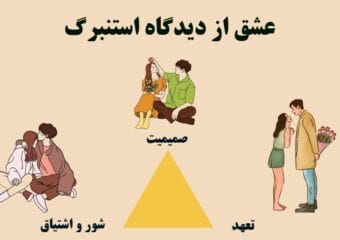Love from Stenberg’s point of view

Love is one of the most complex and multidimensional human phenomena psychologists and researchers have focused on throughout history. There are different opinions about love, and each psychologist offers different definitions and theories based on their specialized field. In this article, we will examine the seven theories of love from Robert Stenberg’s point of view.
Stenberg has analyzed the different dimensions of this feeling by introducing the three-dimensional model of love. He divides love into three main elements:
- intimacy
- passion
- commitment
Based on the combination of these three elements, Stenberg has identified seven types of love. Out of these seven types of love, Stenberg believes only “perfect love” can be recognized as a stable and lasting relationship. Other types of love may fade or disappear over time due to changing life circumstances or emotional inconsistencies.
This theory demonstrates that love is not solely a deep emotion but a multifaceted phenomenon influenced by various social, cultural, and individual factors. Understanding this diversity in love types can help people manage their relationships better and have more realistic expectations of their emotional relationships.
Stenberg’s theories about love are crucial for a better understanding of human phenomena and can serve as a foundation for further research.
Types of love from Stenberg’s point of view
According to Stenberg, love as a complex and multidimensional phenomenon has three fundamental elements: passion, intimacy, and commitment. The stronger the love triangle of people, the more likely the relationship will continue and be stable. Healthy, steady love, with gentle warmth, can be far more productive than intense, fleeting romantic feelings. Consistency and stability in human relationships are key factors in emotional growth and development, while severe and fleeting emotional experiences may only provide a moment of happiness. Based on the combination of these three elements of passion, intimacy, and commitment, Stenberg has identified seven types of love, which we will examine below:
- baseless love
- Love based on interest without commitment
- empty love
- romantic love
- Compatible love with commitment
- stupid love
- early love
- perfect love

baseless love
At this stage, the two people next to each other may be unaware of their true motivations and needs for creating this relationship. This situation can be due to the existence of special needs or social pressures that brought them together. These needs may be rooted in a person’s schemas and past experiences. The conclusion from this analysis shows that people’s better and extreme knowledge of each other can contribute to the stability and depth of their love. In other words, the more people know and understand each other, the more likely their relationship will be stable and meaningful.
Love based on interest without commitment
This type of love is known as a type of love in which there is only an element of interest and passion, while there is no commitment between the parties. In such a relationship, people may support each other emotionally and feel close, but the lack of commitment can lead to the instability of the relationship. This type of love can lead to the growth of intimacy and passion, but in the absence of commitment, the relationship may fluctuate and become unstable. Therefore, commitment can contribute to the relationship’s stability as a key factor.
empty love
Empty love refers to a relationship in which only an element of commitment exists, and other elements, such as intimacy and love, are marginalized. In this type of love, commitment may appear as a social contract or moral obligation, but instead, intimacy and friendship are affected. This situation can lead to monotony and coldness in the relationship and lead people to seek intimacy and passion in other relationships. When there is a lack of commitment to intimacy and love, both parties may feel tired and frustrated.
However, note that love based on commitment is not necessarily negative. Suppose this commitment has a healthy and mutual foundation. In that case, it can lead to the strengthening of other elements of love over time and through processes such as cognitive therapy and sex therapy. In such a situation, it is possible to restore intimacy and passion, and the relationship can improve.

romantic love
Romantic love is a specific type characterized by passion and deep intimacy. In this type of love, people usually experience intense and passionate emotional connections, which may reduce their attention to aspects of commitment due to the intensity of these feelings. In fact, at this stage, people focus more on the pleasures of the moment and spending time with each other and think less about issues of commitment and commitment. However, if this type of love is coordinated and driven through effective and honest communication, it can lead to a lasting commitment.
Suggested article: Relationship mistakes
Compatible love with commitment
Compatible love, often associated with deep commitment and inner intimacy, is a lasting and meaningful love. This love is felt not only on the verbal level but also in the depths of human existence. Unlike lust-based love, compatible love can involve deeper relationships that lead to secure friendships or long-term marriages. In this type of love, excitement, and lust are usually at a lower level and give way to more meaningful commitment and connection. Therefore, because of its low dependence on lust, compatible love can be considered a stable and meaningful relationship built on mutual trust and respect.
stupid love
Foolish love refers to a relationship where passion and commitment are dominant factors. This type of love usually begins with intense feelings and initial excitement but lacks the element of deep intimacy. This love is mostly based on physical attraction and external beauty. Since there is no emotional intimacy in stupid love, people may experience dissatisfaction and instability in the relationship over time. This type of love is often experienced as “love at first sight.” However, not getting to know each other deeply can lead to serious relationship problems.”
early love
Early love refers to relationships usually formed before the parties know each other deeply. This type of relationship can lead to premature sexual experiences and often results in dissatisfaction and separation. In many cases, people who jump into a relationship quickly realize that they are not suitable for each other after a short time. The lack of mutual recognition is the key to the spread of immature love. If people cannot understand the depth of each other’s existence, they might face serious challenges. It can lead to relationships in which dissatisfaction and incompatibility of emotions prevail.
perfect love
Perfect love, a key concept in Sternberg’s theory of love, encompasses the elements of intimacy, passion, and commitment. This type of love leads to a deep and lasting relationship that can eventually lead to marriage and family formation. People in perfect love experience a profound sense of closeness and kinship beyond physical or emotional attraction.
Stenberg states that when two people reach the stage of ideal love, they can no longer imagine themselves with another person. It means that their true and fundamental love is such that thinking about a third person becomes impossible. In other words, original love is so deep and committed that people only consider each other, and there is no other option for them. Another characteristic of perfect love is that when faced with problems and challenges, the parties jointly try to solve the problems instead of blaming each other. This kind of love allows people to face and overcome problems together. While in some relationships, one partner may withdraw in the face of challenges, perfect love emphasizes cooperation and support.
True love, like any other love, involves expressing emotions and feelings. Stenberg emphasizes that without expressing the deepest feelings, even the greatest loves can decline. Expressing love not only helps maintain relationship stability but also strengthens the emotional bond. The relationship may be affected if the parties love each other but do not express this feeling.
After all, perfect love is not just an emotional state but a constructive process. To create such love, honesty, and transparency in behavior and thoughts between the parties is necessary. When both parties have a common understanding of each other and establish honest communication, perfect love will formed, and people can interpret each other in the mirror of perfect love.

